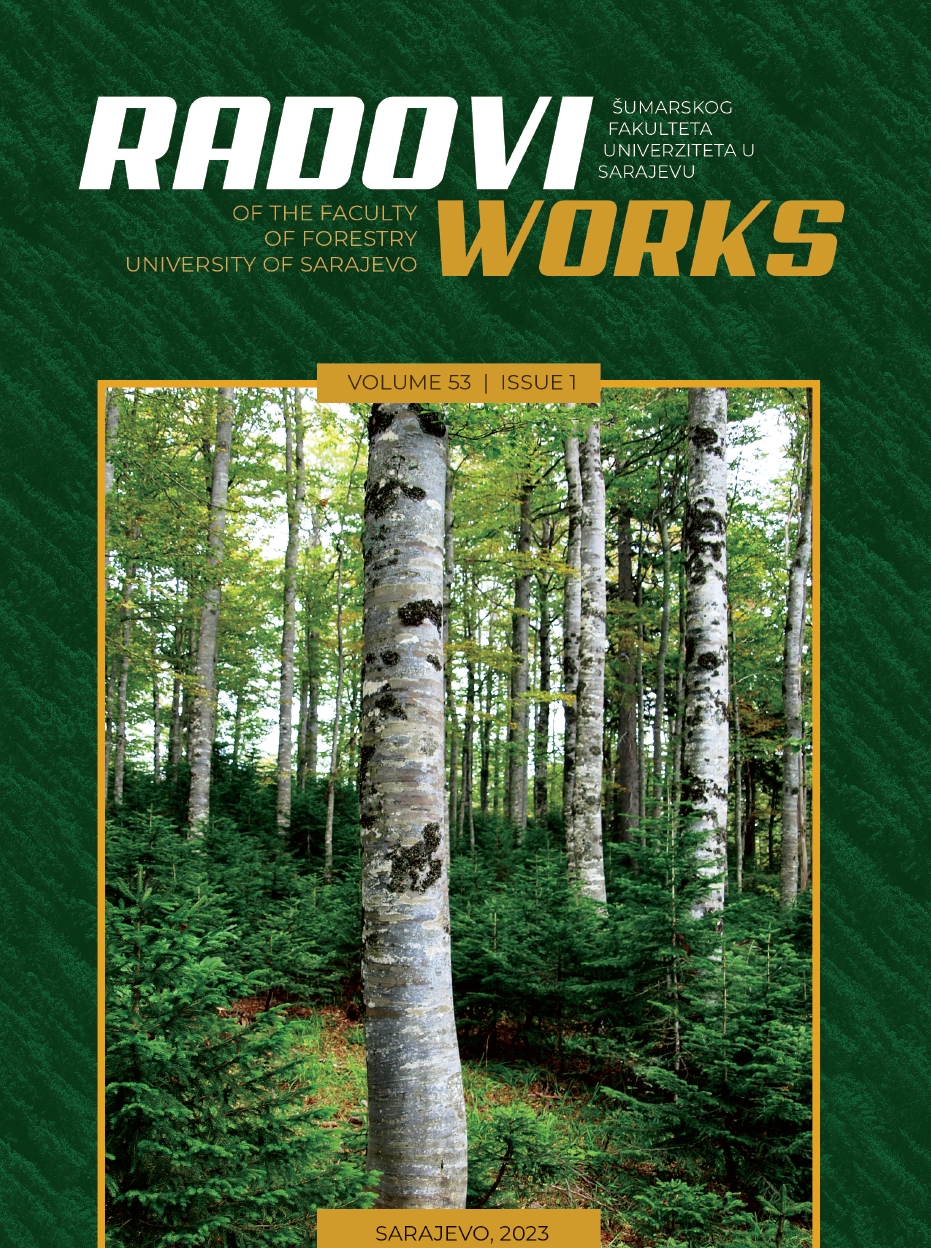Antioksidativni i antimikrobni potencijal eteričnih ulja različitih vrsta bibera (Piper sp.)
DOI:
https://doi.org/10.54652/rsf.2023.v53.i1.556Ključne riječi:
black pepper, white pepper, green pepper, FRAP, DPPHSažetak
Essential oils are mixtures of potent compounds with biological effects, such as those with antioxidant, antimicrobial, antitumor and/or anti-inflammatory effects. In this paper, the antioxidant and antimicrobial activity of essential oils of different types of commercial pepper was tested. Essential oils are prepared by hydrodistillation. Polyphenol content, reduction potential and DPPH radical inhibition were analyzed. Antimicrobial activity was tested on reference strains using the diffusion technique. The analysis showed that the essential oil of black pepper has a significantly higher antioxidant potential compared to the essential oils of green and white pepper. High antimicrobial activity was also found for the black pepper essential oil sample, except in the case of Pseudomonas aeruginosa.
Downloads
References
Bajpai, V.K., Sharma, A., Baek, K.H. (2013). Antibacterial mode of action of Cudrania tricuspidata fruit essential oil, affecting membrane permeability and surface characteristics of food-borne pathogens. Food Control, 32(2), 582-590.
Bakkali, F., Averbeck, S., Averbeck, D., Idaomar, M. (2008). Biological effects of essential oils—a review, Food and Chemical Toxicology. 46, 446–475.
Benzie, I.F.F., Strain, J.J. (1999). Ferric reducing/antioxidant power assay: direct measure of total antioxidant activity of biological fluids and modified version for simultaneous measurement of total antioxidant power and ascorbic acid concentration. Methods in Enzymology, 299, 15-27.
Chahal, J., Ohlyan, R., Kandale, A., Walia A., Puri, S. (2011). Introduction, phytochemistry, traditional uses and biological activity of genus Piper: a review. International Journal of Current Pharmaceutical Review and Research, 2, 130–144
Dyer, L.A., Palmer, A.D.N. Piper: A Model Genus for Studies of Phytochemistry, Ecology, and Evolution. Kluwer Academic/Plenum Publishers; New York, NY, USA: 2004.
Gill, A.O., Holley, R.A. (2006). Disruption of Escherichia coli, Listeria monocytogenes and Lactobacillus sakei cellular membranes by plant oil aromatics. International Journal of Food Microbiology, 108(1), 1-9.
Hikal, D.M. (2018). Antibacterial Activity of Piperine and Black Pepper Oil. Biosciences Biotechnology Research Asia, 15(4), 877-880.
Horozić, E., Zukić, A., Kolarević, L., Bjelošević, D., Ademović, Z., Šarić-Kundalić, B., Husejnagić, D., Kudumović, A., Hamzić, S. (2019). Evaluation of antibacterial and antioxidant activity of methanol needle extracts of Larix Decidua Mill., Picea Abies (L.) H. Karst. and Pinus Nigra J. F. Arnold. Technics Technologies Education Management, 14(1), 14-19.
Li, Y.-x., Zhang, C., Pan, S., Chen, L., Liu, M., Yang, K. (2020). Analysis of Chemical Components and Biological Activities of Essential Oils from Black and white Pepper (Piper Nigrum L.) in Five Provinces of Southern China. Lwt 117
Menon, A.N., Padmakumari, K.P., Jayalekshmy, A. (2003). Essential oil composition of four major cultivars of black pepper (Piper nigrum L.). Journal of Essential Oil Research, 15(3), 155-157.
Morsy, N.F.S., El-Salam E.A.A. (2017). Antimicrobial and Antiproliferative Activities of Black Pepper (Piper nigrum L.) Essential Oil and Oleoresin. Journal of Essential Oil Bearing Plants, 20(3), 779-790.
Myszka, K., Olejnik, A., Majcher, M., Sobieszczańska, N., Grygier, A., Powierska-Czarny, J., Rudzińska, M. (2019). Green pepper essential oil as a biopreservative agent for fish-based products: Antimicrobial and antivirulence activities against Pseudomonas aeruginosa KM01. LWT - Food Science and Technology, 108, 6-13.
Parmar, V.S., Jain, S.C., Bisht, K.S., Jain, R., Taneja, P., Jha, A., Tyagi, O.D., Prasad, A.K., Wengel, J., Olsen, C.E., Boll, P.M. (1997). Phytochemistry of the Genus Piper, Phytochemistry. 46, 591–673.
Silva, M.A., Fialho, S.N., Martinez, L.N., Facundo, V.A., Bonadeu, F., Kaplan, M.A.C., Marques, A.M., Bastos, I.S., Orlandi, P.P., Pessoa, C.D.O., Abreu, B.B., Oliveira, F.C.E., Teles, C.B.G., Kuehn, C.C. (2020). Chemical composition and biological activities of the leaf extract and essential oil from Piper alatabaccum (Piperaceae) fruits. South American Journal of Basic Education, Technical and Technological. 7, 163–185
Singleton, V.L., Orthofer, R., Lamuela-Raventós, R.M. (1999). Analysis of total phenols and other oxidation substrates and antioxidants by means of folin-ciocalteu reagent. Methods in Enzymology, 299, 152-178.
Wang, Y., Wang, L., Tan, J., Li, R., Jiang, ZT., Tang, SH. (2021). Comparative Analysis of Intracellular and in vitro Antioxidant Activities of Essential Oil From White and Black Pepper (Piper nigrum L.). Frontiers in Pharmacology, 12, Article 680754.
Zhang, LL., Xu, JG. (2015). Comparative study on antioxidant activity of essential oil from white and black pepper. European Journal of Food Science and Technology, 3(3), 10-16.























